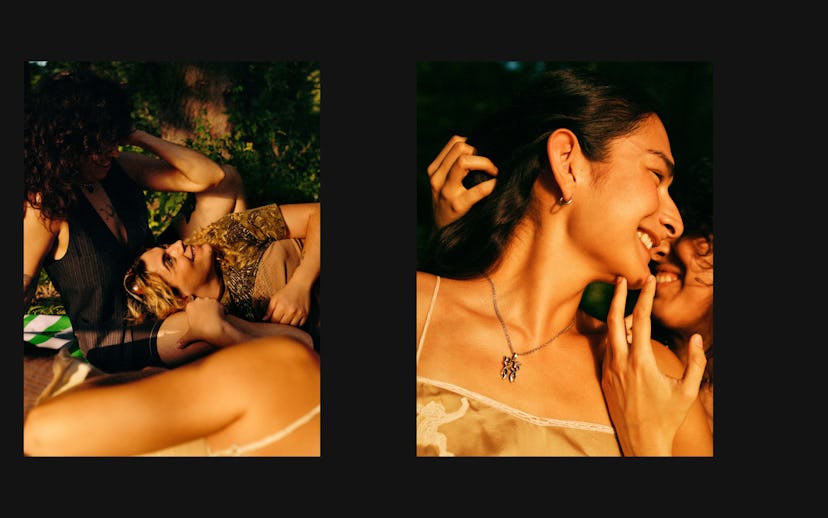
Dating
10 Years of Polyamorous and Non-Monogamous Dating with Feeld
The progressive dating app is celebrating its birthday with a rebrand.
Over the past decade, we’ve witnessed a new wave of non-monogamous lifestyles in the United States. A while non-monogamy is by no means new — starting in the US with the anarchists of the 1880s and then experiencing a resurgence in the 1960s — it’s becoming more widespread than ever before. As people continue to reimagine the family structure, Feeld has been beside them along the way.
Feeld, an app where “open-minded where humans can seek connections of all kinds,” is celebrating their tenth anniversary with a rebrand, which will be launched on the app the week of November 20th. With 62% of Feeld members updating their sexuality, interests, and desires within their first year on the app, the app will now include new “aura” visuals to embody users’ self-discovery journey. The app has also undergone a full redesign through its platform, co-created with Feeld’s members.
Actress Tommy Dorfman went from being an early adopter of the progressive dating app Feeld to becoming a brand ambassador. After using the app during her open marriage and then as a newly single user after her divorce, Dorfman says she loves the “fluidity and expansiveness” inspired by the app. “If you’re a trans person exploring sex and intimacy and dating for the first time in transition, having a safe space to do that is so important,” she tells NYLON. “I think we all deserve love, good sex, and good company.”
Dorfman says that ten years ago, non-monogamy was a harder concept to have a conversation about. She has “almost always” been in open relationships, but is currently in a monogamous one. “Nothing is definitive,” she says, leaving the door open. Thanks to an increase in vulnerable sharing online, Dorfman thinks people are now sharing parts of themselves and how they live their lives which makes other people feel safe to do the same. “If you’re coming to Feeld, you don’t need to perform a version of yourself,” she says. “This is a space where individuality is not only accepted, it's championed so give yourself permission to not edit so much.”
The app’s CEO, Ana Kirova, says that one of her biggest learnings over the past decade has been to return to their community. “At some point, when we veered off a little bit away from our community and we were trying hard to be a tech company,” she says. “So that learning is just to focus on what you are doing — as a company that’s affecting people's lives in such an intimate way — and to be close to your community as much as we can in all the ways that people are comfortable with.” At every point in the rebranding process, Kirova has worked with the Feeld community, from conducting interviews with users to hiring models and photographers from within their network.
Feeld launched in 2014 as the brainchild of Kirova and her partner Dimo Trifonov, after deciding they wanted to extend their romantic relationship beyond the sphere of monogamy. As such, their relationship has grown and shifted alongside the app. “I’ve never known anything else because once I was with him, it was only a little while after that Feeld became a part of our life too,” she says. Kirova says their relationship has flowed between being “quite closed” to then being “quite open,” meaning she’s also had the chance to hop on Feeld as a user. “Before, I was a lot less known when using the platform but now it’s a bit different,” Kirova says.
Kirova says the rising dialogue around non-monogamy comes down to a “perfect storm” of social media connecting us all across the world and young people embracing a more fluid approach to identities. “I think we're seeing that happiness can have various forms, and relationships can look very different, and with access to information on what’s possible, our worlds become multicolor,” she says. “We can see all sorts of different options of being ourselves, being happy, being full, wholesome, part of society, and yet being very different from each other.”
Where relationship norms have previously categorized people under set labels or goals, Kirova says she’s witnessing more people approaching connections with a true curiosity for each other instead. “That’s actually at the core of it all,” she says. “We’ve found that on Feeld there’s a journey driven by a curiosity for other people and yourself”. According to the app, the 20 “most curious” cities include London, New York, and Los Angeles.
With a sparkly new rebrand, the app may have a new look and feel but Kirova says the core of Feeld is “still the same.” “The heart is the same, which has always been about the value of human experience and the ability to be your authentic self, and for relationships to take whatever form you want them to take,” she says. “But what’s changed is that we've decided to open up to more ways for us to connect to our people.” With a decade under its belt, Kirova’s goal for Feeld over the next ten years is to stay as close to their community as they are right now.
This article was originally published on